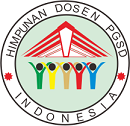ANALISIS KEGIATAN ICE BREAKING UNTUK COPING STRESS SISWA SEKOLAH DASAR
DOI:
https://doi.org/10.24114/sejpgsd.v15i2.66271Keywords:
Ice Breaking, Coping Stress, , Elementary School Students, Academic StressAbstract
Academic stress is a common challenge faced by elementary school students, which can negatively impact their emotional well-being and academic achievement. One strategy that can help students cope with stress is ice-breaking activities. This study aims to analyze the role of ice-breaking activities in helping students at SDN Waru manage stress. The research employs a qualitative approach with a case study design. Data were collected through observations and interviews with teachers and students involved in ice-breaking activities. The findings indicate that ice-breaking activities create a more enjoyable learning environment, enhance social interactions, and help students better regulate their emotions. Various activities, such as group games, physical movements, humor or funny stories, breathing exercises, and singing, have been proven effective in reducing stress and increasing students' learning motivation. Therefore, implementing ice-breaking activities in the learning process not only transforms the classroom atmosphere into a more engaging one but also plays a crucial role in supporting students' psychological well-being.References
Agustina, F., Darussalam, H., & Faiza, N. (2020). Gambaran Tingkat Stres Pada Anak Sekolah Dasar. Lentera Perawat, 1, 43–48.
Aini, A. Q., & Ismiyanti, Y. (2025). Pengaruh Model Pembelajaran Read Answer Discuss Explain Create Berbantuan Media Puzzle Terhadap Kemampuan Bernalar Kritis Pendidikan Pancasila Pada Kelas IV Sekolah Dasar. Integrative Perspectives of Social and Science Journal (IPSSJ), 2(1), 1042–1051. http://repository.radenintan.ac.id/22866/
Bili, L. D., & Dewi, M. (2019). Efektivitas Senam Otak Dalam Meningkatkan Konsentrasi Belajar Siswa. Jurnal Penelitian Dan Pengembangan Pendidikan, 2(2), 68–78.
Desmidar, D., Ritonga, M., & Halim, S. (2021). Efektivitas ice breaking dalam mengurangi kejenuhan peserta didik mempelajari Bahasa Arab. Humanika, 21(2), 113–128.
https://doi.org/10.21831/hum.v21i2.41941
Fadilla, annisa R., & Wulandari, P. A. (2023). Literature Review Analisis Data Kualitatif: Tahap Pengumpulan Data. Mitita Jurnal Penelitian, 1(No 3), 34–46.
Fitriyani, F. N., & Mustikasari, M. (2023). Hubungan Dukungan Sosial Dan Kecerdasan Emosional Terhadap Tingkat Stres Siswa Smp Di Jakarta Timur. Jurnal Persatuan Perawat Nasional Indonesia (JPPNI), 8(2), 73. https://doi.org/10.32419/jppni.v8i2.471
Harianja, M. M., & Sapri, S. (2022). Implementasi dan Manfaat Ice Breaking untuk Meningkatkan Minat Belajar Siswa Sekolah Dasar. Jurnal Basicedu, 6(1), 1324–1330.
https://doi.org/10.31004/basicedu.v6i1.2298
Ismiyanti, Y., & Permatasari, N. D. (2021). The effect of pictorial story media on critical thinking of grade 4 SDN 1 Pendem. Jurnal Ilmiah Pendidikan Dasar, 8(2), 118.
https://doi.org/10.30659/pendas.8.2.118-128
Khairanis, R., & Aldi, M. (2025). Peran Mindfulness Berbasis Islam terhadap Kesejahteraan Psikologis Siswa di Era Digital. Akhlak: Journal of Education Behavior and Religious Ethics, x(x), 90–104.
Mahendika, D., & Sijabat, S. G. (2023). Pengaruh Dukungan Sosial, Strategi Coping, Resiliensi, dan Harga Diri Terhadap Kesejahteraan Psikologis Siswa SMA di Kota Sukabumi. Jurnal Psikologi Dan Konseling West Science, 1(02), 76–89.
https://doi.org/10.58812/jpkws.v1i02.261
Rahayuni, I. G. A. A. (2020). Metode Membentuk Kesehatan Mental Siswa Melalui Kegiatan Ice Breaking. Cetta: Jurnal Ilmu Pendidikan, 3(2), 359–370. https://doi.org/10.37329/cetta.v3i2.459
Rahmayanty, D., Harahap, N. H., Hasanah, U. D., Setiawati, Y., & Rahma, Z. (2020). Hubungan Stres Akademik Dengan Kepribadian Siswa. Jurnal Bimbingan Penyuluhan Islam, 05(01), 147–165. https://jurnal.unimus.ac.id/index.php/JKJ/article/view/12723/pdf
Rofiah, C., & Bungin, B. (2021). Qualitative Methods : Simple Research With Triangulation Theory Design. Kaos GL Dergisi, 8(75), 147–154.
https://doi.org/10.1016/j.jnc.2020.125798
Sirait, S., Anim, Elfira rahmadani, & Ely Syafitri. (2024). Penerapan Ice Breaker Game Untuk Meningkatkan Motivasi Belajar Siswa. Transformasi : Jurnal Pendidikan Matematika Dan Matematika, 7(2), 265–272. https://doi.org/10.36526/tr.v7i2.3277
Siregar, W. A. (2021, October). Diduga Stres karena Tugas Sekolah, Siswa SD Ini Bunuh Diri Minum Racun. Okezone.Com, 2.
https://news.okezone.com/read/2021/10/04/608/2481000/diduga-stres-karena-tugas-sekolah-siswa-sd-ini-bunuh-diri-minum-racun
Sulasti, S., Surachmi, S., & Kanzunnudin, M. (2024). Pengaruh Ice Breaking Terhadap Motivasi Belajar Siswa Sekolah Dasar. Prosiding Seminar Nasional, 101–115.
Wana, P. R., Ruchiyat, M. G., & Nurhidayah, S. (2024). Pengaruh Ice Breaking terhadap Motivasi Belajar Siswa Sekolah Dasar. Jurnal Jendela Pendidikan, 4(01), 110–124. https://doi.org/10.57008/jjp.v4i01.698
Yuliana, M. I., & Ismiyanti, Y. (2025). Pengaruh Game Based Learning Berbantuan Quizizz. Jurnal Pendidikan Sultan Agung, 5(1), 56–63.
Zumrotun, E., Kusumadewi, R. F., Ismiyanti, Y., & Prananto, I. W. (2023). Analisis blended learning di SDN 04 Mejobo. Jurnal Ilmiah Pendidikan Dasar, 10(1), 36. https://doi.org/10.30659/pendas.10.1.36-49
Additional Files
Published
Issue
Section
License
Copyright (c) 2025 SCHOOL EDUCATION JOURNAL PGSD FIP UNIMED

This work is licensed under a Creative Commons Attribution-ShareAlike 4.0 International License.
Authors whose manuscripts are approved are approved as follows:
- The publication rights for all journal manuscript materials published/published on the SEJ (School Education Journal) E-Journal site are held by the editorial board with the author's knowledge (moral rights remain with the manuscript authors).
- The formal legal requirements for accessing this electronic digital journal article are subject to the terms of the Creative Commons Attribution-ShareAlike (CC BY-SA 4.0) license, which means that E-Journal SEJ (School Education Journal) has the right to store, transfer media/format, manage in the form of a database, maintain, and publish articles without asking permission from the author as long as the author's name remains as the copyright owner.
- Manuscripts published/published electronically are open access for educational, research, and library purposes.













